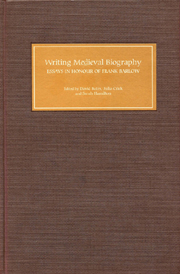Book contents
- Frontmatter
- Contents
- Preface
- List of Abbreviations
- Introduction
- 1 Did Charlemagne have a Private Life?
- 2 Bones for Historians: Putting the Body back into Biography
- 3 ‘Carriers of the Truth’: Writing the Biographies of Anglo-Saxon Female Saints
- 4 Alfred and his Biographers: Images and Imagination
- 5 Re-Reading King Æthelred the Unready
- 6 Writing the Biography of Eleventh-Century Queens
- 7 The Flemish Contribution to Biographical Writing in England in the Eleventh Century
- 8 The Conqueror's Earliest Historians and the Writing of his Biography
- 9 Secular Propaganda and Aristocratic Values: The Autobiographies of Count Fulk le Réchin of Anjou and Count William of Poitou, Duke of Aquitaine
- 10 Reading the Signs: Bernard of Clairvaux and his Miracles
- 11 Arnulf's Mentor: Geoffrey of Léves, Bishop of Chartres
- 12 The Empress Matilda as a Subject for Biography
- 13 The Gesta Stephani
- 14 Writing the Biography of Roger of Howden, King's Clerk and Chronicler
- 15 Writing a Biography in the Thirteenth Century: The Construction and Composition of the ‘History of William Marshal’
- 16 The Strange Case of the Missing Biographies: The Lives of the Plantagenet Kings of England 1154–1272
- Index
10 - Reading the Signs: Bernard of Clairvaux and his Miracles
Published online by Cambridge University Press: 12 September 2012
- Frontmatter
- Contents
- Preface
- List of Abbreviations
- Introduction
- 1 Did Charlemagne have a Private Life?
- 2 Bones for Historians: Putting the Body back into Biography
- 3 ‘Carriers of the Truth’: Writing the Biographies of Anglo-Saxon Female Saints
- 4 Alfred and his Biographers: Images and Imagination
- 5 Re-Reading King Æthelred the Unready
- 6 Writing the Biography of Eleventh-Century Queens
- 7 The Flemish Contribution to Biographical Writing in England in the Eleventh Century
- 8 The Conqueror's Earliest Historians and the Writing of his Biography
- 9 Secular Propaganda and Aristocratic Values: The Autobiographies of Count Fulk le Réchin of Anjou and Count William of Poitou, Duke of Aquitaine
- 10 Reading the Signs: Bernard of Clairvaux and his Miracles
- 11 Arnulf's Mentor: Geoffrey of Léves, Bishop of Chartres
- 12 The Empress Matilda as a Subject for Biography
- 13 The Gesta Stephani
- 14 Writing the Biography of Roger of Howden, King's Clerk and Chronicler
- 15 Writing a Biography in the Thirteenth Century: The Construction and Composition of the ‘History of William Marshal’
- 16 The Strange Case of the Missing Biographies: The Lives of the Plantagenet Kings of England 1154–1272
- Index
Summary
MUCH OF the first Life about Bernard of Clairvaux concerns miraculous events which many contemporaries held demonstrated him to be a man of exceptional gifts, a man of God. Modern scholars, with few exceptions, have dismissed the miracles as without significance. My purpose is to suggest that read carefully they throw considerable light upon Bernard's development and the impact he had upon his world. Through them we come to understand him better. This theme seemed appropriate since Frank Barlow, the scholar honoured in this volume, wrote about two men who, like Bernard, were held to be saints in the twelfth century, that curious king, Edward the Confessor, and that stubborn and strange archbishop of Canterbury, Thomas Becket.
That few scholars have taken Bernard's miracles seriously emerges from the many volumes which appeared following the celebration of the nine-hundredth anniversary of his birth in 1991. Only one, Vie et légendes de saint Bernard de Clairvaux, contains three pieces involving his miracles, of which only one has them as a central theme. There Boglioni, Professor of Medieval History at the University of Montréal, and Picard, a Cistercian monk at Notre-Dame-du-Lac in Quebec, built upon Picard's dissertation, prepared under Boglioni's supervision and published in 1991. Common report holds that when earlier Picard confessed in a Cistercian session at Kalamazoo that he was working upon Bernard's miracles, the reaction was stupefied hilarity.
- Type
- Chapter
- Information
- Writing Medieval Biography, 750–1250Essays in Honour of Frank Barlow, pp. 161 - 172Publisher: Boydell & BrewerPrint publication year: 2006



